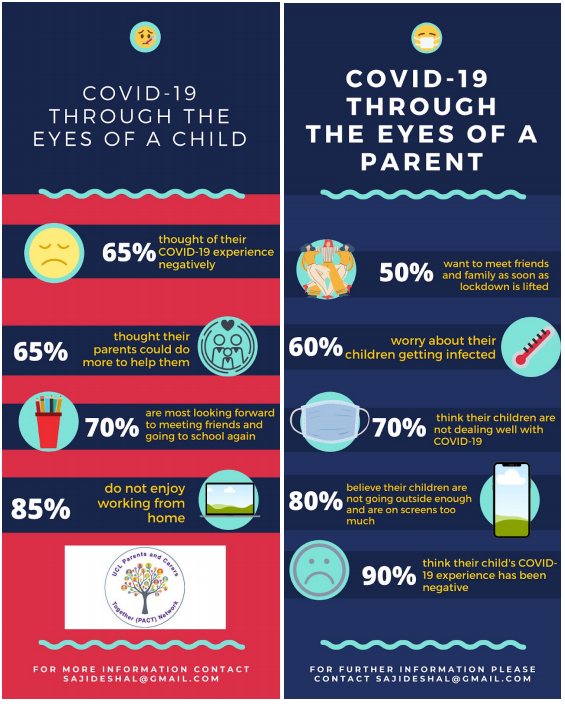Experiences of Children & Young People During Covid-19
The latest research on Covid-19 has explored the experiences of children and young people and the impact the pandemic and lockdown have had on them.
COVID-19: What does it mean for my family and I? A journey through the eyes of a child
Research recently released, which has been conducted by Dr Sajid Saleem and his 15 year old daughter Eshal Sajid, has explored the experiences of young people during the current pandemic. The involvement of Eshal in leading the research project has allowed the experiences of young people to be fully acknowledged, the project itself is exploring the emotional state of young people, how they are coping during the pandemic but also what they are looking forward to. The research also highlights the disparity in the experiences of young people through the eyes of the young people themselves and through their parents eyes.

Key themes arose from both surveys and focus groups which highlighted the key issues for young people and how they are experiencing the current pandemic.
Exercise
60% of young people have tried to incorporate some form of physical activity into their daily lives. However, it is important to note that this research was conducted when going outside was limited to just once a day. It is important to note that these limitations proved challenging for young people in different ways with it being tough for those who were used to spending significant amounts of time outside as well as for those who are natural hibernators. Furthermore, physical activity has proven a point of contention between young people and their parents due to the types of activity young people wish to undertake with them more likely to want to participate in at-home workouts whereas parents preferred outdoor activities. Finding a middle ground of physical activity is an important part of managing relationships and perceptions of physical activity during this time.
Mental Health
100% of young people thought that focussing on mental health during self-isolation was the most important thing to do, this is a larger emphasis on mental health than parents placed; in fact all the discussions with young people circled back to mental health. It is important to note once more the differences between parents and young people with their perceptions on managing poor mental health with parents highlighting a need for a strict routine and daily fresh air whilst the young people felt that taking care of your mental health could also include a day of doing nothing and relaxing your mind from everyday stresses.
“Quarantine has given me a chance to work on my mental health and improve it, as school was too stressful”
Routine
Young people highlighted the need for routine, 100% felt it was something they needed as it helps maintain normality. However, young people emphasised the desire for this to be flexible in order to suit their mood and feelings. The difference in perceptions of screen usage also comes into play with parents viewing screen time as procrastination whilst young people view it as a sign of taking time out.
Screens
95% of young people said their screen usage has increased a lot during quarantine. Screens are however, a key part of life and the research emphasised the need for parents to accept that it is a key part of socialising at present and that it needs to be incorporated into the daily routine of the household.
More information on this study can be found here.
Co-SPYCE and Co-SPACE
Researchers form University of Oxford, University of Reading, University of Southampton and Emerging Minds are currently running research into the impact of Covid-19 for pre-school children, 2-4 year olds, (Co-SPYCE) and children and young people, 5-16 (Co-SPACE).
Co-SPYCE found that nearly 3/4 of parents and carers felt that they were not sufficiently able to meet the needs of both work and their pre-school child. The top stressors on parents and carers in this research was work, child’s screen time and their child’s wellbeing with the most common worry of parents for their children is that they are unable to see their friends and attend social and sporting activities.
It is promising to see that over 80% of pre-school children are physically active for at least 30 minutes a day, however, for 2-4 year olds the recommended activity levels is three hours which just over a fifth are achieving.
Co-SPACE is focussed upon school aged children, 4-16 years old, and is completed by parents with the opportunity for young people, 11-16 year olds, to also participate in addition to their parents or carers.
It is concerning to see that 12% of adolescents (11-16 years) and 2% of children (4-10 years) reported not partaking in any physical activity in the past week as well as 7% of adolescents and 2% of children did not spend any time outside.
The latest report saws parents reporting an increase in emotional, behavioural and restless/attentional difficulties amongst primary school age children. However, amongst secondary school age children, parents reported a reduction in emotional difficulties and an increase restless/attentional behaviours, the young people themselves reported no change in their own emotional, behavioural and restless/attentional behaviours. It is possible that the ability for adolescents to connect with their peers online has minimised the adverse effect of lockdown. Meanwhile, parents/carers of children with SEN and those with a pre-existing mental health difficulty reported a reduction in their child’s emotional difficulties and no change in behavioural or restless/attentional difficulties.
The first Co-SPYCE report can be found here and the full set of reports for Co-SPACE can be found here.
Researchers from all three studies came together to discuss the research as well as recommendations for practical parenting in the pandemic, you can watch the discussion back here.
